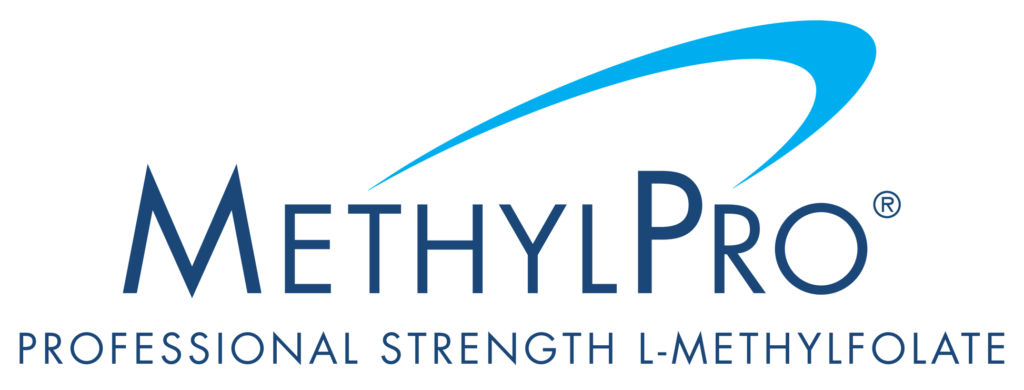The Role of Folate in Fertility, Conception, Pregnancy, and Healthy Birth
Folate plays roles in both male and female fertility, fetal development, and in a pregnant mother’s health. Whether you’re pregnant, thinking about getting pregnant, or could become pregnant, taking a prenatal with folate, or a prenatal and methylfolate, is a smart choice.
MethylPro® now offers a 1 mg dose of L-methylfolate, which delivers a daily abundance of activated folate designed to suit most healthy mothers and those trying to conceive. Here, we are sharing all of the ways in which L-methylfolate can support both parents and child through the journey to a healthy birth and beyond.
What does folate do in the human body?
“Folate” is the general, all-encompassing term for vitamin B-9, a water-soluble member of the B-complex. As a water-soluble vitamin, folate cannot be stored for very long in the body. It must be supplemented regularly to keep levels balanced in the body.
The form of folate found naturally in our food is in the tetrahydrofolate (THF) form. The folate used in food fortification and most dietary supplements is synthetic folic acid. There are 3 major problems with these forms:
1. Natural food folate is not very bioavailable.
2. Food folate can be degraded by cooking.
3. Not all bodies are built to easily process synthetic folic acid.
What form of folate should I supplement?
This is why L-methylfolate makes a great supplement. L-methylfolate, also known as 5-methyl-THF, L-5-MTHF, 5-MTHF, or just methylfolate, is the form of folate that the body actually uses. In order to use folate found naturally in food, or folic acid, specific enzymes must be present in abundant quantities to convert those forms into methylfolate. Taking a methylfolate supplement directly means you do not have to rely on your body to make this conversion.
Methylfolate is a cofactor in the synthesis of new DNA and RNA. All of the cells in our body are constantly making RNA to dictate protein synthesis and new DNA as they multiply. Thus, folate is necessary in every cell, all the time.
However, it is most essential during periods of growth and development. This happens throughout life in cell types that are rapidly dividing (liver cells, red blood cells, etc.). Vitamins B-6, B-12, and methylfolate are all essential to the production of ATP in the mitochondria of all cells. So, they are especially important for cells that make and use a lot of energy (heart, muscle, brain, etc.).
Methylfolate, specifically, also plays a role in methylation, an important biochemical process for the production of neurotransmitters such as serotonin. Methylation is also necessary for the conversion of homocysteine to methionine. Homocysteine build-up can occur when folate levels are too low for this conversion to happen effectively. High homocysteine can have serious consequences on your health over time.
How does methylfolate support fertility?
As mentioned above, folate is necessary for making new DNA for rapidly dividing cells. Sperm are rapidly dividing cells. So, folate likely dictates, in part, how many healthy sperm cells a man’s body can make containing functional DNA. As such, a combination of zinc and folic acid supplementation can lead to a 75% increase in sperm count and quality in subfertile men [1].
Newly fertilized embryos are made up of rapidly dividing cells. Higher folate intake support higher rates of implantation, clinically-assisted pregnancy, and live birth [2]. The mechanisms behind this effect are not certain, but there are multiple possibilities.
In women, healthy folate levels in follicular fluid support better quality oocytes (eggs) and a higher mature oocyte yield upon retrieval, in cases of assisted reproduction [2].
How does methylfolate support a mother during pregnancy?
Women with genetic variants that negatively affect their folate processing abilities (such as MTHFR gene variants) tend to experience higher rates of unexplained infertility or difficulty conceiving, but also recurrent miscarriage and postpartum mental health challenges, among other issues, indicating a role for folate in the body’s defense against these issues [3]. Helathy folate levels have also been assocaiated with healthy iron levels and healthy peripheral nerves in expectant mothers [4]. Similarly, high homocysteine (a marker of low folate status) is a known risk factor for adverse pregnancy outcomes [5].
Recurrent pregnancy loss is defined as two or more consecutive miscarriages occurring before 20 weeks of gestation. A recent study concluded that a specific variant in a mother’s MTHFR gene is a more powerful predictor of recurrent pregnancy loss than her age [6]. It is highly likely that folate levels are at least partly responsible for the mechanism behind these stats, due to the timing of the miscarriages in gestational development [6].
Women with rare polymorphisms in other folate-metabolizing genes are more likely to experience gestational complications. SHMT1(1420)T has been associated with a 90% increased risk of spontaneous preterm birth and MTRR(66)A doubles a woman’s risk of preterm birth [7].
These studies are valuable whether or not you possess these genetic variations. They show how universally important folate is, not only for a developing baby but also for their mother and the environment she creates for the embryo to thrive. It is also important to note that having one of these genetic variants doesn’t doom you from having a healthy pregnancy. It just means that you need to be extra vigilant about keeping your folate levels up from sources other than folic acid, and preferably in the form of methylfolate.
How does methylfolate support a baby’s development?
Again, as potential people, made up of rapidly dividing human cells containing DNA, folate is absolutely necessary for the development of an embryo. The accuracy of DNA multiplication during this stage is more important than at any other life stage. Folate is so important to this process that the risk of developing neural tube defects, such as potentially-fatal anencephaly and spina bifida has been directly related to the mother’s folate status at and around the time of conception. Folate is also critical to the production of normal red blood cells and for the prevention of megaloblastic anemia.
The tricky thing about this fact is that approximately 50% of pregnancies in the US are unplanned. Therefore, many women are not yet taking a prenatal vitamin at the time of conception and the embryonic neural tube (which will become the baby’s spine and brain) develops before many women know they are pregnant.
Rates of neural tube defects have been reduced overall in response to mandated folic acid fortification of certain cereal grains. Folic acid is used in these products because it is much more stable against cooking and light than the natural folate found in food sources. Unfortunately, as we continue to mention, not all bodies are able to process synthetic folic acid. For these people, it is either difficult or impossible to maintain a healthy folate status from food alone. Methylfolate supplements, however, can fulfill this need.
All people need a certain level of folate to function optimally, but those who are capable of bearing children should maintain a higher intake of folate due to the possibility of an unexpected pregnancy. The consequences of having insufficient folate upon conception are serious and potentially life-threatening to your baby.
Do I need supplementary folate if I’m already taking a prenatal vitamin?
Whether or not you should supplement folate on top of a prenatal multivitamin/mineral formula depends on the quality of your prenatal formula and your individual folate needs. A high quality, potent formula, such as Metabolic Maintenance®’s FemOne™ already contains 1 mg (1000 mcg) of L-methylfolate. For most healthy females of childbearing age, this amount is more than sufficient to provide healthy, balanced folate in the circulation. Most prenatal vitamins on the market, however, do not provide such a potent dose of folate in this highly bioavailable, activated form. It doesn’t mean you need to throw out your prenatal, but you may want to add extra supplementary methylfolate.
If you know you have a genetic polymorphism affecting your ability to process folic acid, 1 mg extra of l-methylfolate may be the boost you need to balance your folate levels. But, you may also need more. For instance, the CDC recommends women who have been pregnant with offspring diagnosed with neural tube defects in the past may need at least 4 mg of folate per day during conception and early pregnancy (even without a genetic variant). The range of individual needs is very broad. This would be an excellent conversation to have with your doctor.
References
- https://www.sciencedirect.com/science/article/pii/S0015028201032290
- https://www.ncbi.nlm.nih.gov/pmc/articles/PMC4172634/
- https://natural-fertility-info.com/mthfr-gene-folic-acid.html
- https://www.ncbi.nlm.nih.gov/pmc/articles/PMC3218540/
- https://web.s.ebscohost.com/abstract?direct=true&profile=ehost&scope=site&authtype=crawler&jrnl=20401744&AN=79463396&h=CQeXGq8mOuz%2fWE575ZiR%2bbBpIx5cBQS5xcIFyS%2b7W0I7FOrSlAAB%2bt9ohk2ebrg0jfHeogKrRXhHBDaSm2k8Zw%3d%3d&crl=c&resultNs=AdminWebAuth&resultLocal=ErrCrlNotAuth&crlhashurl=login.aspx%3fdirect%3dtrue%26profile%3dehost%26scope%3dsite%26authtype%3dcrawler%26jrnl%3d20401744%26AN%3d79463396
- https://bmcresnotes.biomedcentral.com/articles/10.1186/s13104-018-3321-x
- https://www.sciencedirect.com/science/article/abs/pii/S0002937806009495

